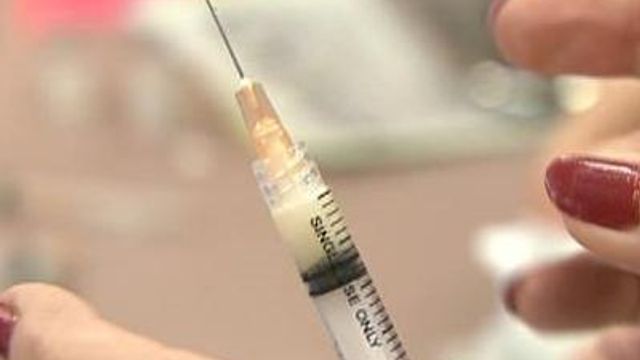State cutting immunizations for some children
Budget cuts mean the state will no longer cover the cost of some childhood vaccines for children with insurance.
Posted — UpdatedBudget cuts mean the state will no longer cover the cost of some childhood vaccines for children with insurance.
Children who are uninsured, underinsured, eligible for Medicaid or Native American are still able to receive the immunizations for free.
"During tough economic times, those that have resources, we're going to just ask them to perhaps contribute more than they have in the past, where those without resources we certainly want to protect," state health director Dr. Jeff Engel said.
That means private health insurance companies, like Blue Cross Blue Shield North Carolina, will most likely cover the vaccines the state used to pay for and the cost will be passed along to consumers in the form of higher premiums.
"The legislation will increase BCBSNC medical costs in that hat used to be state-funded will not be paid for by our member's premium dollars," said Bob Michael, a spokesman for the insurance company. "We have not quantified the cost impact."
The change, which takes effect Dec. 1, applies to 11 vaccines, including combination shots, Hepatitis A and the second dose of Varicella, the chicken pox vaccine.
Engel said the state estimates the change will cut about $4 million from the $18 million North Carolina Immunization Program.
Pediatricians were notified of the change in an Oct. 30 memo from the North Carolina Department of Health and Human Services. They are now trying to determine how they will pay for the vaccines with no guarantee they will get reimbursed from insurance companies.
The immunizations can cost up to $100 or more each.
"It will put pediatricians in the position of having to purchase those vaccines if we want to offer them," said Dr. Leanna Willey, a pediatrician with Carolina Kids Pediatric Associates in Raleigh.
Her practice, she said, plans to continue to offer the vaccines.
"You just see what happens – whether the insurance will cover the cost of the vaccine or not," Willey said. "Typically, vaccines are not money-making propositions for pediatricians. We just know it's the right things to do for the kids and their health."
The change comes as a surprise to some parents, leaving them with questions.
"Why are they cutting that? Why can't they cut something else?" said parent Boumet Boutavong, who has a 1-year-old daughter.
"I don't want to pay a high price for it or anything like that, but my kids need these vaccinations."
• Credits
Copyright 2024 by Capitol Broadcasting Company. All rights reserved. This material may not be published, broadcast, rewritten or redistributed.





